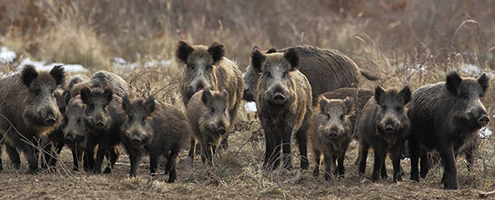
07 Apr 2017 PRESS RELEASE – AFRICAN SWINE FEVER IN WILD BOAR: THE WAY FORWARD FOR EUROPEAN HUNTERS
On Thursday 6 April, FACE, the Federation of Associations for Hunting and Conservation of the EU, in conjunction with CIC, the International Council for Game and Wildlife Conservation, organised a workshop on “Preparing Hunters for African Swine Fever” in Brussels.
African swine fever (ASF) is a highly transmissible disease affecting pigs and wild boars with serious socio-economic, wildlife and public health consequences. The disease can spread rapidly, irrespective of national borders.
With regard to wildlife management and hunting, AFS can be devastating. At the workshop, Linda Dombrovska, Latvian Hunters’ Association stated: “Since ASF hit Latvia in 2014, it changed all aspects of hunting: our traditions, our approach to wildlife management, the behaviour of animals, and brought multiple economic implications. Hunters elsewhere in Europe need to get ready for this dangerous disease and carefully prepare an approach to control its spread”.
In January 2014, Lithuania made the first notification of ASF cases in wild boar, and Poland followed in February 2014. In June and September 2014, Latvia and Estonia respectively also reported ASF. The source of the ASF virus is from neighbouring Eastern countries (Russian Federation, Belarus and Ukraine). Recent research shows a real risk of further spread into other Member States with the highest risk for Slovakia and Romania, followed by Finland, Czech Republic and Germany.
Nikolaus Kriz, European Food Safety Authority (EFSA), discussed the EFSA opinion on ASF and the range of possible mitigation measures to prevent introduction and spread of the ASF through wild boar. With regard to management, it was concluded that: “…drastic reductions in wild boar numbers have not been shown to reduce the risk for introduction and spread of ASF in wild boar populations”.
While the EFSA opinion contains some excellent approaches, it is clear to FACE and CIC that a “one size fits all” strategy will not work in addressing ASF in wild boar populations. For example, FACE Members have recently expressed concerns about how national authorities have interpreted and implemented recommendations about hunting methods, carcass disposal, financing, and communication.
Francesco Berlingieri, DG SANTE, European Commission, stated that: “Regionalised measures have been put in place in Estonia, Latvia, Lithuania and Poland. We need to remain vigilant and Member States need to continue to work with hunters and other stakeholders to ensure a high level of awareness and preparedness in the Member States. With regard to hunting, we need to ensure that we use the most effective management strategies, for example, applying a gradual approach ensuring a selective focus on females”.
“We have recognised the possible threat four years ago and we started to plan to train hunters all over especially Central and Eastern Europe in collaboration with OIE (World Organization for Animal Health) now for a number of years. We have secured through OIE some necessary funding from the European Commission to realize our plans. It is high time that we prepare now our hunters with the assistance of FACE to monitor and control the disease through entering into a logical, strategic collaboration with the OIE veterinarian network” said George Aman, President of the CIC representing worldwide more than 30 million hunters.
______
FOR FURTHER INFORMATION PLEASE CONTACT:
Ludwig Willnegger, Secretary General of FACE – ludwig.willnegger@face.eu
Tamás Marghescu, Director General of CIC – t.marghescu@cic-wildlife.org

